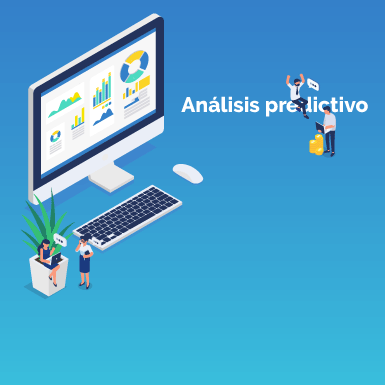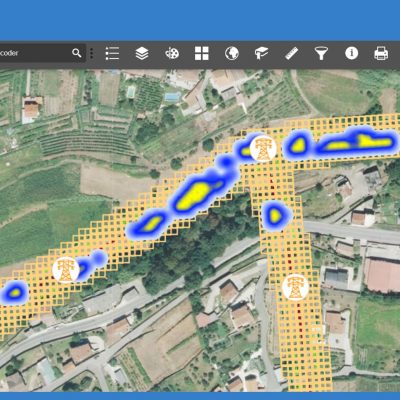
There are many elements that influence the digital transformation of businesses: technology, training the staff, systems… but data, transformed into information and consequently, knowledge, are the keys to a successful transformation.
In a company, information grows continuously and comes from different sources. In order to guarantee a company’s productivity, it is necessary to possess tools that integrate different applications or sources and gather the data, in order to produce different reports that will become valuable at the time a decision is taken.
Today productivity and agility in business are united in their quest to capture, process, store and analyse business data. Companies that know how to capitalize on data, make better decisions are more productive, efficient and profitable than those that don´t.
Successful organizations are prioritizing the concept of business intelligence and requiring their workforce to do the same, thus becoming more analytical than ever. To have a competitive advantage in 2018, businesses have to recognize strategies, use technologies and adopt business roles that will provide a more successful BI model.
Gartner, a Big Data expert, predicts that by 2020 businesses will have adopted many BI tools because they will have realized that they are limited by what little they know about the data they have.
What are the challenges facing companies in the Digital Transformation?
Some of the main challenges facing companies in the Digital Transformation are:
- All companies possess data, but few turn that data into information. We can store data from many sources: clients, sales, administration… But in order to exploit the data, we have to dig deep into it and integrate it into different business applications in order to obtain useful business information and knowledge.
- Eliminate departmental silos. Businesses need help to align all departments with a common strategy and corporate objectives. It is essential that companies link corporate objectives with operational decisions and day to day decisions in different departments.
- All companies have applications or management systems that are different in each department. This impediment does not allow for a global vision of all business data that is available. This imposes a limit on the decision making process, as there is no 360 degree view of all the information the business has. This information fragmentation means that a same report can give different results.
- Lack of automation in data management. Manipulating data manually using different applications and tools means that getting information is slow, costly and unreliable.
It is important to recognize these challenges and adapt one´s company with a Business Intelligence tool.
What is Business Intelligence?
Business Intelligence (BI) is the set of processes, applications and technologies that are used to obtain business data quickly and easily; coming from different management systems which a company works with, in order to analyze and interpret information and turn it into knowledge. Thanks to business intelligence, data can be used for decision making.
Business intelligence acts as a strategic factor for a business, giving it a competitive advantage: Having privileged information to respond to the business´problems
A Business Intelligence tool allows us to:
- Observe What is happening?
- Understand Why it is happening?
- Predict What will happen?
- Collaborate What should the team do?
- Decide What course of action should be followed?
What are the dimensions of Business Intelligence in the decision making process:
The information provided by Business Intelligence might have different reaches:
- Operational Level: Using the information for day to day decisions
- Tactical Level: Provides information to middle management for monthly analysis and decisions; which are useful for follow up and taking action.
- Strategic Level: Decisions that will have a major impact on the business, used by company leadership.
What are Business Intelligence tools for?
Information is an essential resource for any business. The data used in daily operations, data collection and its exploitation afford a business a competitive edge and greater possibilities of growth. Thererfore, it is very important to use data wisely: integrating information and having access to it, at the right moment, is essential, so it can be analysed for informed decisions.
For this reason, Business Intelligence tools have become more and more popular, as they are able to integrate all necessary information and have it available whenever needed.
The use of Business Intelligence tools can make the difference between businesses that grow and those that do not. The use of these tools can be the difference between success and failure.
Business Intelligence tools organise information in a way that it can be exploited from different angles and at the highest level. They display information on dashboards and reports can be customised depending on one’s needs. The information, is therefore, presented to the user in an agile and accessible manner in order for a proper analysis and interpretation to be done.
What are the benefits of Business Intelligence?
Business Intelligence offers numerous benefits for your business:
- Visibilidad completa de las operaciones de tu negocio. Con las herramientas de inteligencia de negocios no es necesario tener que solicitar a cada departamento de la empresa la información que se necesita para poder realizar un análisis. La información se encuentra en un único lugar y se puede extraer los datos de forma segura, sencilla y en tiempo real.
- Eficiencia. poder acceder a los datos de manera sencilla y ágil genera información de valor, la cual se puede visualizar en una única plataforma para aprovechar todos los datos de manera eficiente y realizar análisis y tomas decisiones eficaces.
- Complete Visibility of your business´operations. With BI tools you do not have to ask each department to send you information to carry out your analysis. The information is centrally located and you can access it directly. The data is safe, quickly accessible and in real time.
- Efficiency. Access data easily and quickly, thus creating valuable information. It can be seen on a single platform; you can take advantage of all the data efficiently and carry out correct analyses and decisions.
- Speed. Information has to be available when it is needed. Getting it late is of no use sometimes. To make a decision at the right time is key; it is important that the information is readily available, without wasting any time looking for it. Thanks to BI you can have information in seconds, easily, clearly and concisely, and all at your fingertips.
- Complete Control. In every area of a company, information is generated daily. This is an asset that can be taken advantage of in the decision making process.
- Better Customer Service. Businesses accumulate tons of customer information. The challenge is to transform this information into knowledge. In order for you to have the most important information will allow you to offer your clients better service, as you have a window to your client’s needs.
- Detailed and comprehensive centralized reports. Business Intelligence platforms allow you to visualize the information you want through dashboards, which give you a centralized vision and detailed company information. Since you are able to personalize your dashboards, you can focus on the most important data without having to sort through tons of information. Furthermore, these tools can be customised to the needs of any department.
- Reliability for correct decision making. A system that does not offer reliable information will lead us to make incorrect decisions. But BI solutions allow us to manage correct and necessary information that we can rely on. In turn, questions we need answered are done more reliably. Business Intelligence allows you to react to unforeseen events, as the information is precise and thereby reduces the risk of making a bad decision.
Why do I need a Business Intelligence tool for my business?
To manage information is crucial for the decision making process, whether they be operational or strategic decisions. The decision making process is more secure when it is based on reliable sources of information that help reduce uncertainty and risk.
The capacity to extract, filter, consolidate, synthesize and present reliable data and information automatically can only be done with BI tools.
It is essential to put BI tools in the hands of people that have to make decisions. The tools are agile, flexible and reliable; customised to the user’s needs. Business Intelligence does not require the intervention of other departments to get information, as one gets it oneself. This allows for a deeper interactive analysis.
BI tools, once they are used properly, will be a company’s most important asset.
Transform your business with a BI tool.
At CIC we have the experience and know how to transform your business data into valuable information. And that information, in turn, into productive knowledge, so you can optimize the decision making process.
LUCA BDS is the technology that is key for your organization; it gives those who have to make decisions all the necessary and reliable information they need to correctly and confidently face any challenge the business will confront.
LUCA BDS is the Business Intelligence tool that will help you optimize your operations in an integral manner and give you instantaneous access to complete information and help accelerate your company’s growth.


